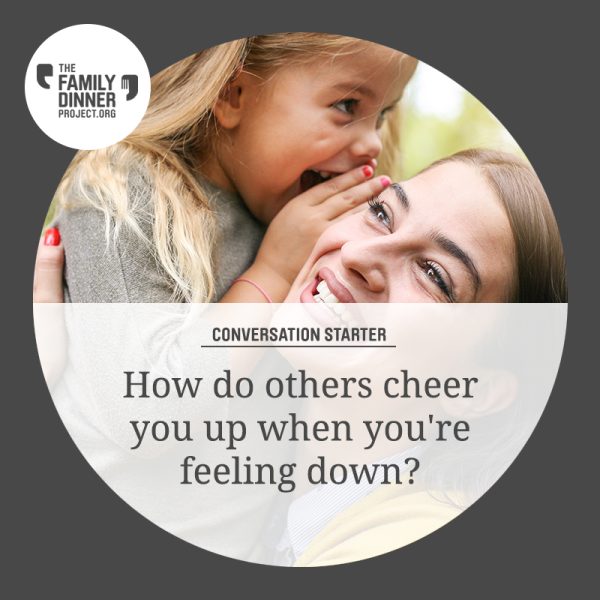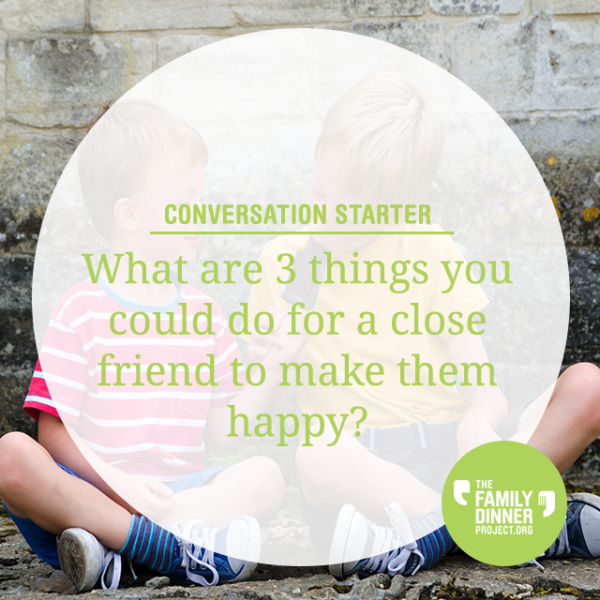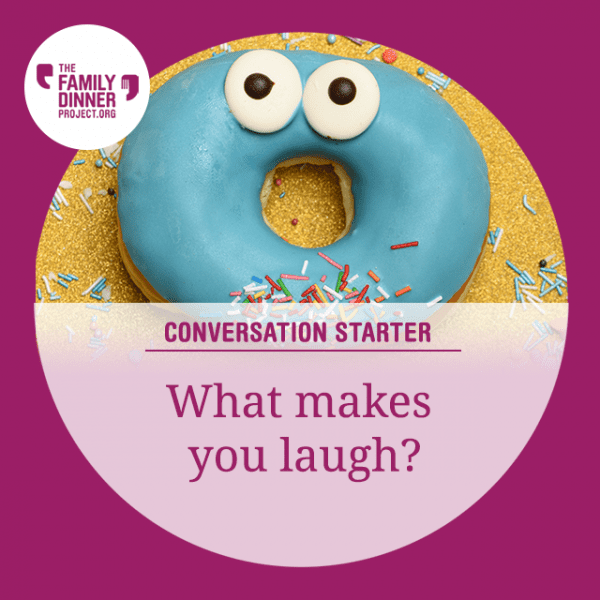Newsletter: April 2025
New Research: Family Dinners Boost Happiness

March 20 was World Happiness Day, and also the release date for an important new research study about family meals. The study’s authors used data from the Gallup World Poll and the American Time Use Survey to conduct the first ever global survey of shared meals. They dug into how often people are eating together and how those meals – or the lack of them – impacts happiness and well-being. News flash: Americans are eating together less frequently than ever, and it’s not doing us any favors in the happiness department.
In 2023, one in four Americans reported eating all of their meals alone the previous day. That’s a 53% increase from 2003. And in those twenty years, while all age groups reported an increase in solo dining, young people were the biggest drivers of the change. People between the ages of 18 and 34 are eating alone almost 180% more frequently now than they did two decades ago.
That’s the bad news, or some of it, at least – if you’re highly invested in family dinners, like we are, the full report shows several worrisome trends. But there’s also really good news here:
Eating with other people is a simple, accessible, and highly effective way to boost your happiness.
How do we know? The researchers tracked a number of indicators across 142 different countries, adjusted all of the data for other factors such as socio-economic status, employment status, gender, age, and education level, and discovered that the single most consistent factor impacting happiness and life satisfaction was how frequently people ate meals with others. The research showed such a strong correlation between happiness and shared meals, in fact, that eating with other people had a similar impact on well-being to income level or employment. The numbers show clearly that no matter how old you are, where you live, how well-educated you are, or what your income level is, if you regularly eat meals with others, your satisfaction with life will improve, your negative affect will decrease, and you’ll feel more positive overall.
There’s a wealth of information and data in the report, but we want to particularly highlight a few points:
- The “sweet spot” for the greatest benefits to happiness and life satisfaction seems to be 13 shared meals per week. The researchers surveyed weekly frequency of lunch and dinner, but we have found that breakfast or an intentional, leisurely shared snack can work in terms of providing opportunities to connect with others over food. Can’t do 13 meals together? Even those people in the study who ate only one meal a week with others showed an increase in their well-being, and if you’re able to do more, research shows that there’s a big improvement in happiness for people who eat with others 5-8 times per week.
- Eating with others has a particularly strong impact on the well-being of teens and young adults. The research demonstrates that people in the 16-24-year-old group experienced a larger positive impact on both their life satisfaction and positive moods than older adults. (Though we want to stress that every age group showed a happiness and well-being boost when they ate more communal meals!)
- Eating just one meal per day with someone else increases emotional well-being. Americans of all ages, genders, and socio-economic status reported greater happiness, lower stress, less pain, and less sadness when they had shared a meal with someone the previous day. There was even a very small decrease in how tired they reported feeling when they had eaten with someone else.
- It’s not (necessarily) the phones. Anticipating that the rise in smartphones and other accessible technologies might have something to do with the increase in solo dining and general social isolation over the past 20 years, the researchers tracked the data against the timeline of significant technological advances, like the advent of social media and the release of the iPhone. There was no demonstrable correlation. In other words, people were already starting to eat together less frequently before social media became popular, and the trend lines have continued steadily upward with no significant observable peaks that can be traced to technology. That being said, of course technology always offers an opportunity for distraction and self-isolation; so while we can’t blame the phones for our isolated meals, we can look critically at how we use them, and when.
So what’s the biggest takeaway? Looking at the studies done on dinner over the years, all signs have pointed to family meals as an important factor in mental health and well-being; now this new research proves that the correlation is even stronger than previously thought. And the really good news is that this is something we can all take action on right away in our own lives. Starting today, what can you do to increase the number of meals you share with friends and family each week? Odds are that adding even just a handful to your routine will make you a happier, more satisfied person.
Need tips and ideas for making mood-boosting meals part of your routine? Listen to Dr. Anne Fishel’s appearance on the Happiness Lab Podcast!
Food

Dr. Anne Fishel mentioned her “yoga eggs” on the Happiness Lab Podcast. Try this fast and easy meal idea to help you squeeze in more family time!
Yoga Night Eggs and Vegetables
Fun

Get serious about happiness at your next family meal with the Try Not to Laugh Challenge.
Conversation
Keep the mood upbeat with these conversation starters about happiness and fun!






Recent Newsletters
- Ask The Family Dinner Project - February 2026
- Warming Up Winter - January 2026
- Home, and Homemade, for the Holidays - December 2025
- Thanksgiving Traditions, Old and New - November 2025
- Food as Comfort and Care - October 2025
- The State of Family Dinner - September 2025
- Back to School Dinner Success - August 2025
- What’s Your Meal Planning Personality? - July 2025
- A New Guide to Gathering - June 2025
- Celebrating 15 Years of The Family Dinner Project - May 2025
- New Research: Family Dinners Boost Happiness - April 2025
- Just the Two of Us - March 2025
